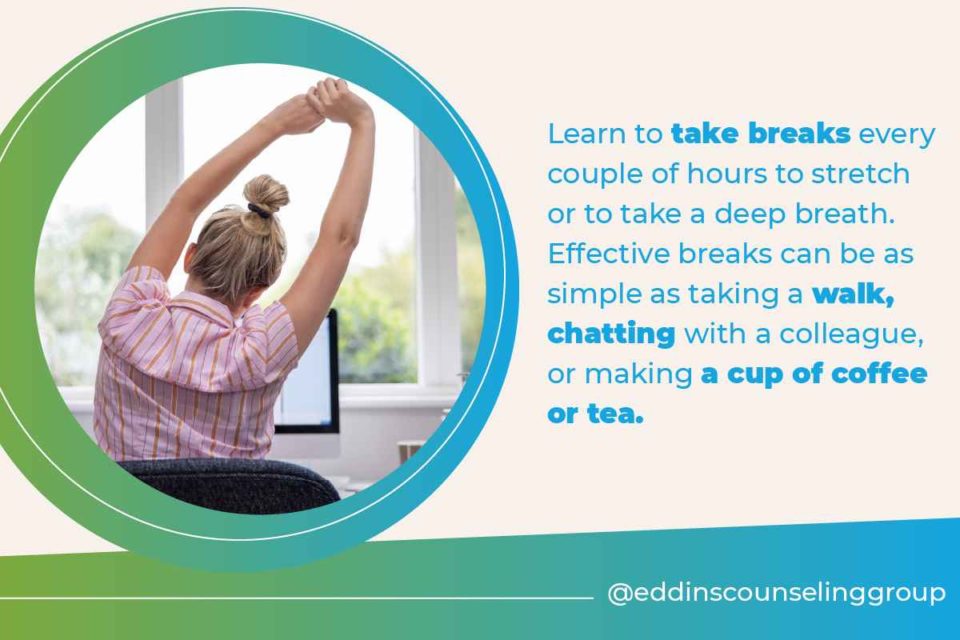January 30, 2023
How to Balance Mental Health and Achieve Career Goals
Written by Guest Author
Posted in Career Planning and with tags: Goals, career direction

Everyone hopes to balance mental health and career goals. But, to be fair, the first three years of the pandemic have been tough for everyone.
Research shows 1 in 5 adults reported mental problems due to COVID-19 strict social protocols. So all of this increased stress and anxiety trickles down to your personal and professional life, affecting your relationships and work productivity.
While you do have the opportunity to work from home, work life and personal life may not always mix too well, especially when done unexpectedly. You must have the resilience to make such significant adjustments successfully.
Why Work-Life Balance Matters
Work-life balance matters for many reasons. When people know how to balance mental health and their career, they have a greater sense of fulfillment.
When work responsibilities consume most of your time and energy, it can lead to various mental and physical health problems.
In fact, prolonged stress can cause impaired cognitive function and sleep problems.
Juggling your career and mental health does happen overnight because it’s a process of learning and unlearning habits that may or may not be useful in the present moment.
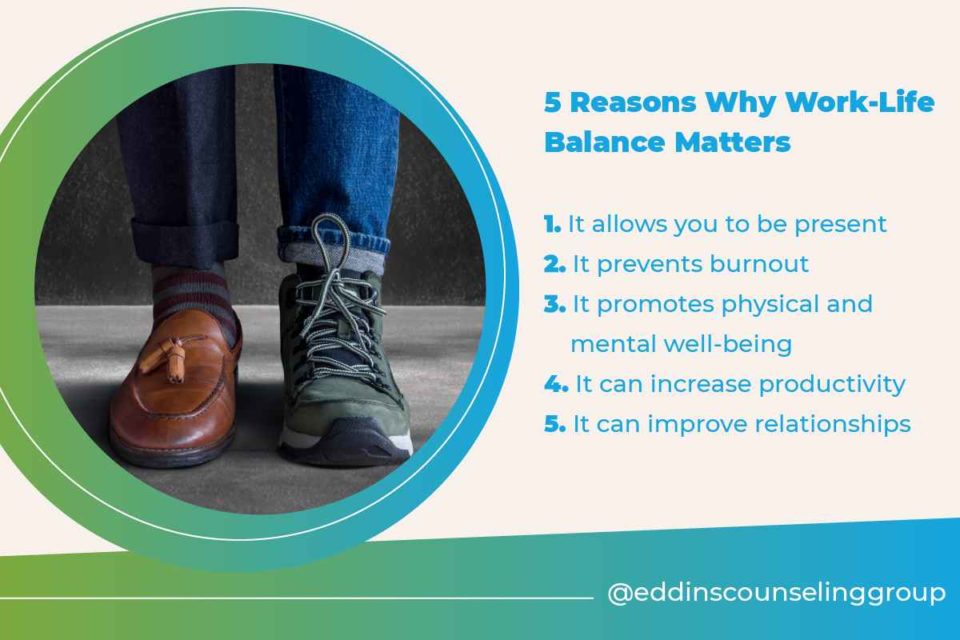
So here’s why work-life balance is important:
- It allows you to be present
People always complain that they find it hard to focus on what they’re doing. They feel mentally cluttered with overwhelming thoughts. They’re always thinking about work when spending time with their family, so they constantly check their work emails. But you can rewire your brain to stay in the present moment by creating a balance between work and your personal life.
- It prevents burnout
Burnout is when you experience a great deal of physical and emotional exhaustion. While it’s merely an occupational phenomenon, it still affects your overall well-being.
For example, when people constantly work long hours or take on too many responsibilities at home, it can lead to burnout. But if you manage your priorities straight, it’ll help you focus on your career without jeopardizing your mental health.
- It promotes physical and mental well-being
When people have time to relax, pursue hobbies, develop their careers and spend time with loved ones, they are likely to feel happy, fulfilled, and healthy. So it’s important to know what you value most in life and set boundaries for those that drain your energy.
- It can increase productivity
People now realize that working long hours doesn’t always mean producing higher output. On the contrary, it’s quite the opposite in the long run. But when you set certain rules around your schedule, your brain goes into your flow state, boosting your focus and productivity.
- It can improve relationships
A healthy work-life balance can also help improve relationships with family, friends, and loved ones. Your productivity increases when your private matters don’t bubble over your work.
At the same time, a well-maintained work life that doesn’t cascade into your personal time, your relationships will blossom due to your dedication.
The importance of balancing work and personal life doesn’t only affect you but also those around you. Your positive energy will become contagious when you interact with people in and out of your workspace.
So as people get to see your best side, career opportunities will come your way easily.
How to Balance Mental Health and Achieve Your Career Goals
With so many drastic changes that transpired over a short period of time, it’s hard to adapt quickly. But rest assured. You can come out of the other end stronger because you’re able to face adversities head-on.
Whether you’re feeling the tension in your work due to personal matters or vice versa, giving yourself space to reflect is essential. As a result of your going deeper into your experience, you’ll understand how to balance your mental health and professional life.
If you’re unsure where or how to begin this journey, these helpful tips on how to balance mental health and achieve career goals are a good place to start:
Establish healthy boundaries early
Having boundaries to divide your work and personal time gives you control over your life. It involves setting limits on the amount of time and energy you devote to work. This can include the following:
- Putting a cap on how much overtime you work,
- Not working on projects in your allotted free time,
- Knowing what personal information you want to share with colleagues, and
- Being clear about what tasks your capacity can cover.
While it can be challenging to spot when people cross your boundaries at first, it’s never too late to reinforce it.
Learn to take breaks
Your productivity goes down when you work long hours. So learn to take breaks every couple of hours to stretch or to take a deep breath. It’ll help you stay energized and focused, lowering any amount of stress to get quality results.
Effective breaks can be as simple as taking a walk, chatting with a colleague, or making a cup of coffee or tea. Then, you’ll notice how your attitude will change after taking a short break.
Never underestimate self-care
Self-care doesn’t have to be something extravagant like going to the spa because it can be as simple as getting enough sleep and eating a healthy diet.
Whatever self-care means to you, it should be done in a conscious effort to improve and balance your mental health so you can commit to your career far better than before.
You may establish a mindful routine for every mundane task you do every day and learn to enjoy the habits you create for yourself.
Seek guidance and support
Your support system consists of your close family and friends who are there for you at your lowest and highest points in life. These people can provide a listening ear, offer advice, or help you find coping strategies.
But there may be instances where it’s difficult to regulate your emotions. In that case, it might be more helpful to seek professional care. These counselors can guide you to find the right solutions rather than having people assume what’s right for you.
Set achievable goals
Having clear, SMART, and achievable goals can help you stay motivated and focused, but it’s important not to take on too much at once.
Instead, prioritize your tasks and break them down into smaller, more manageable chunks. This can help you avoid feeling overwhelmed and ensure that you are making progress toward your goals.
It’s okay to say “no”
It’s not always easy to say “no” because people want to avoid conflict, show commitment, or don’t want to let others down. But there are better ways to go about achieving your career goals than being a “yes” person.
When you take on more responsibilities than your bandwidth can handle, you compromise the quality of what you want to accomplish. So it’s important to set limits and say “no” to requests or demands that are unrealistic or unreasonable.
Here are some phrases to politely say “no” that you might find helpful:
- “Sorry, but I have other plans.”
- “I’m afraid I can’t. I’m working at full capacity right now.”
- “I’m currently focusing on _____. Would it be possible if I can do it tomorrow?”
- “I’m not versed in doing this task. But is there anything else I can do for you?”
- “I’m sorry, but I have to make time for my family this weekend.”
Only you know your own limits, so you shouldn’t feel guilty for rejecting any requests. But soon, you’ll realize that you can deliver more than what is expected of you by saying ‘no.’
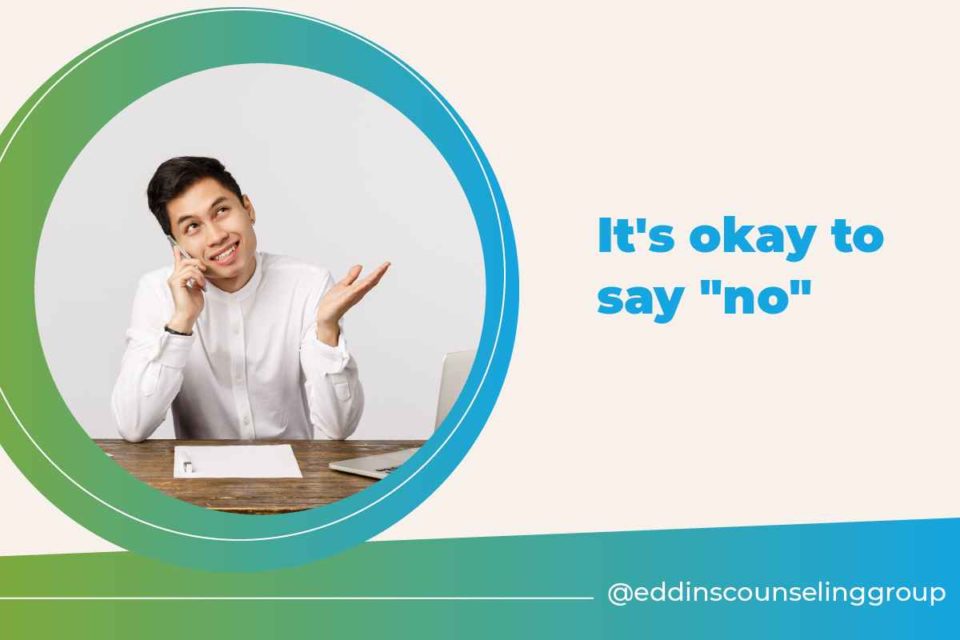
Create a strategy that works for you
What works for one person might not work for another, so it’s important to find strategies that work for you. This might include setting aside specific times for work and leisure, delegating tasks, or finding ways to integrate your personal and professional lives.
Experiment with different time management techniques, such as time blocking, where you strictly block off time for specific tasks. Another one is the pickle jar method, where you do the high-priority things first, and the rest will follow.
Explore stress management techniques
Everyone stresses about something. But there’s a big difference between healthy stress and chronic stress. Good stress is the force that pushes you to take action even though it seems scary, while unhealthy stress stops you in your tracks, causing distress and poor performance.
When tension builds up, whether it’s about work or personal reasons, there’s always a method to go about it. It’s never a dead end. You may give yourself some positive pep talk, listen to ambient music, or take a 5-minute mental inventory.
Understand that you can’t control everything that happens in your career, as there are external factors that can affect it. Your emotions are the only thing that you have authority over. Sure, you’ll still feel negative emotions, but now you have the power to accept and let go of them.
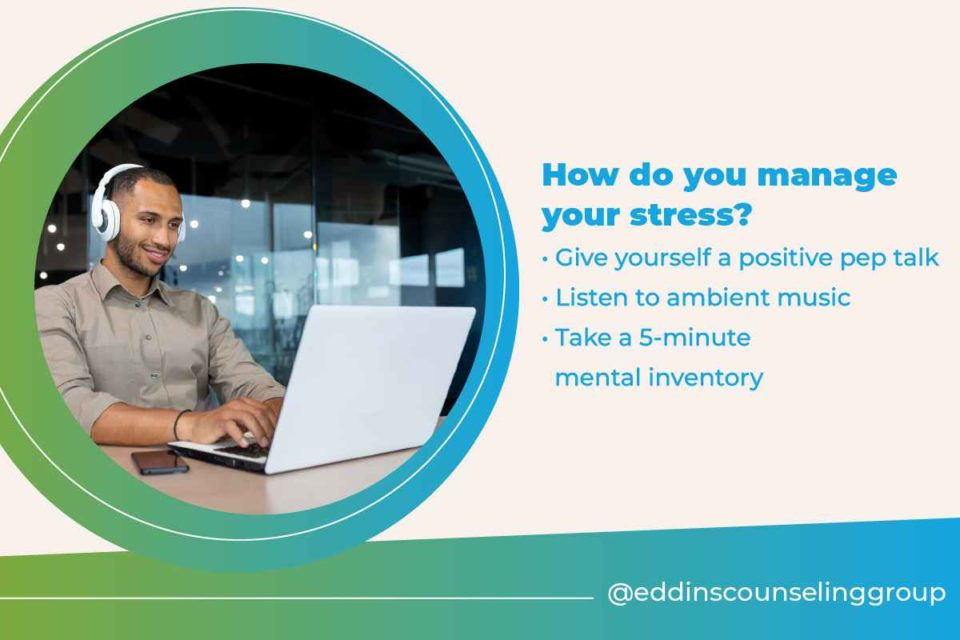
There’s Ebb and Flow in Balancing Mental Health and Your Career
Finding your center in the midst of achieving your career goals and your mental health is a process of self-discovery. The strategies you put in place may work in the past but might not work today. So as you grow and progress professionally, continue to remind yourself that there’s no such thing as the perfect balance.
Think of your experience as a pendulum, gracefully swaying back and forth. Still, you always find yourself back at your center. Whatever gets thrown at you, you see to it that you have the tenacity to get back on your feet. That’s how you balance mental health and your professional life.
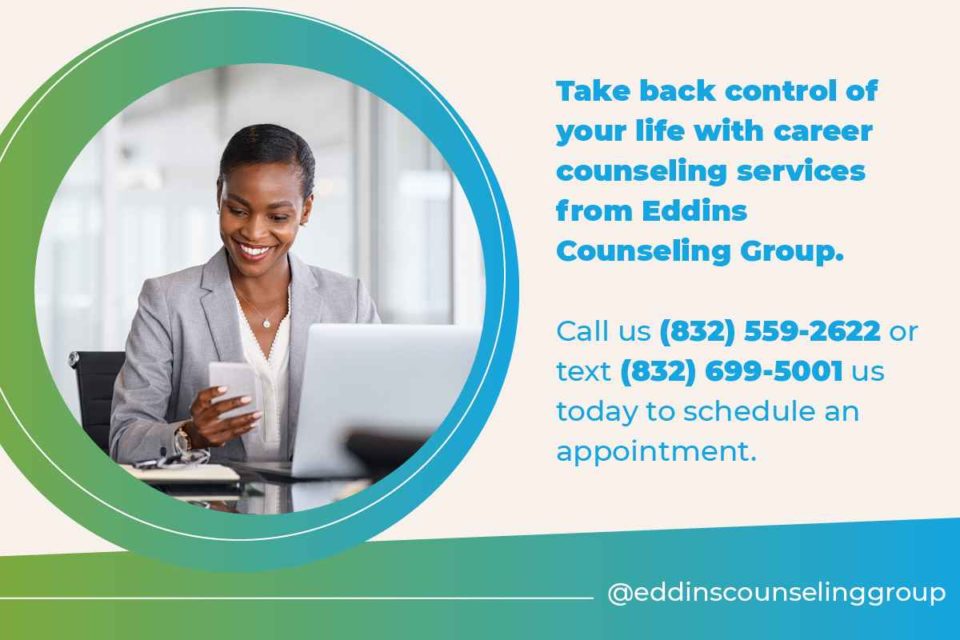
Next Steps
Do you need help balancing your mental health while achieving your career goals? Career counseling services can help you find the direction and confidence you need. Call or text Eddins Counseling Group today to schedule an appointment with one of our Houston, Montrose, or Sugar Land therapists.
Call (832) 559-2622 or text (832) 699-5001
Land Your Dream Job
Get instant access to your free ebook.
7 Steps to Positive Career Changes
Get instant access to your free ebook.
Identify Your Skills
Get instant access to your free ebook.

